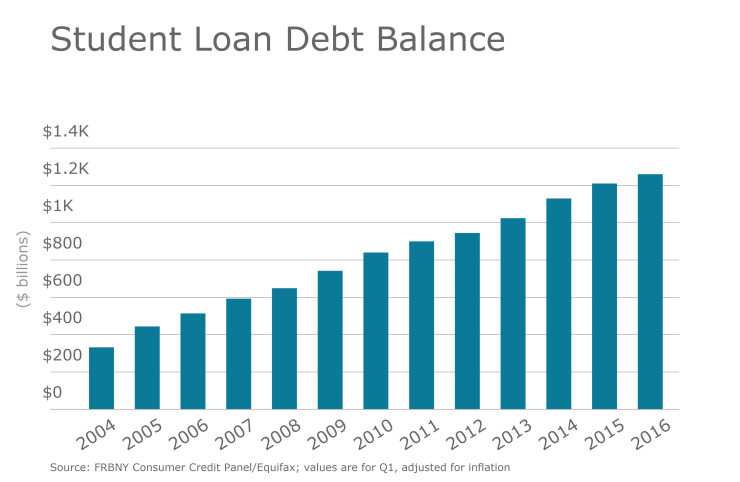Student loan debt has a major impact on how much people are saving for retirement.
The big surprise is that it doesn’t matter how much debt a person carries. Just the “mere presence of debt weighs on people,” says Geoff Sanzenbacher, associate research director for the Center for Retirement Research at Boston College. “They don’t save much no matter how much debt they have. That is a little bit surprising.”
According to the Center for Retirement Research in its research brief, “
Student loans, even if the payments are manageable, tend to have an impact on a person’s financial decisions, particularly if they decide to save for retirement or not.

Sanzenbacher says that automatic enrollment and automatic escalation programs can help overcome this phenomenon because most people who are auto enrolled into a retirement plan stick with the default and don’t end up opting out of the plan.
Employers could also offer student loan debt repayment options or at least automatic deduction programs for student loan payments, he says. That means having student loan payments automatically deducted from a worker’s paycheck each month.
“Payment of loans through payroll may get people over the hump,” says Sanzenbacher. Workers will think about it less if it is automatically coming out of their paycheck.
It is a mental game in some respects because “you are still paying it but it is not coming out of your spendable income. It is a little strange, but I do think that is how people think about this to some extent,” he says.
Sanzenbacher adds that more employers would be amenable to adding payroll deduction options for student loans than adding student loan debt repayment programs as part of their overall benefits package.
Some industries, like the tech industry, are always looking for ways to stay competitive. They need to attract and retain the best talent, so they always searching for new benefit options.
Individuals who are 30 years or more away from retirement are less likely to give retirement savings a thought, especially if they have student loan debt.
With company perks being a key attraction and retention tool, here’s a list of some of the best ones innovative employers are offering.
The Center for Retirement Research found that college graduates fare better financially than those who attend college but don’t graduate. It also found that college graduates who don’t have student loan debt tend to have better financial outcomes than those with debt.
Large amounts of debt also increase the likelihood that a person will fall behind in their debt payments and put them at a greater risk of bankruptcy.
The Center for Retirement Research thought that the size of the loan payment would impact the amount a person puts into retirement savings.
“In reality, however, a young worker with a student loan may focus solely on paying off that loan before shifting to a longer-term objective like retirement savings,” the report said.
Policymakers, when they do discuss ways to help people save more for retirement, often mention finding ways to help people reduce their debt, but “reducing debt isn’t going to have a huge effect on retirement savings,” Sanzenbacher says. “As long as their debt is still there, it will have an impact.”






